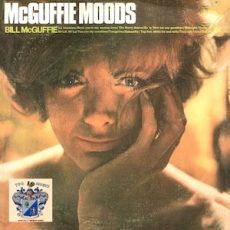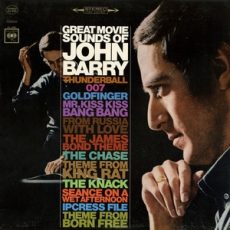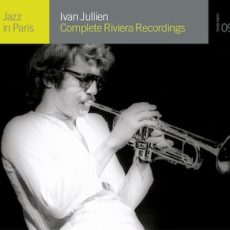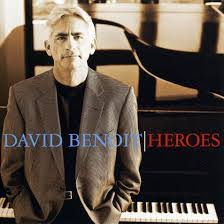
Daily Dose Of Jazz…
Bill McGuffie was born on December 11, 1927 in Carmyle near Glasgow, Scotland. After three years studying the piano he had an accident as a child which caused the loss of his second finger of his right hand, but despite the accident he started playing again and modified his technique. By the time he turned eleven he was awarded the Victoria Medal for his piano proficiency by the Victoria College, Glasgow.
Finding it difficult he decided to stop playing until friends and colleagues suggested playing dance music. Towards the end of World War II when he was 17, he moved to London and began a career in 1946 playing in the Teddy Foster Orchestra at the Lyceum.
Working with other top bands followed until 1952 when he got his big break when the BBC formed their own show band run by Cyril Stapleton. McGuffie was a featured artist with a big public following, which led to a recording contract and he was voted in top place in the Melody Maker readers’ poll from 1953 to 1955. This led to him appearing in the early Esquire jazz poll winners records and recorded with trumpeter Kenny Baker’s Dozen.
He made a limited number of records which were jazz tinged and a big band record. Bigger success came with his light music and his albums with strings. Noted for his great musicianship and his impeccable good taste, his jazz records with the Kenny Baker Dozen and one track from the Melody Maker’s All-Stars are available. He also recorded albums with no jazz content, and worked extensively with bandleader Joe Loss, where he was featured.
He won an Ivor Novello Award in 1960 for his composition Sweet September, a Song Writers’ Guild Badge of Merit, and the British Academy of Songwriters, Composers and Authors Gold Badge of Merit.
Pianist Bill McGuffie, who went on to be a film composer and conductor, and with the onset of cancer, died on March 22, 1987 at the age of 59.
More Posts: composer,conductor,history,instrumental,jazz,music,piano

Daily Dose Of Jazz…
Terry Plumeri was born John Terryl Plumeri on November 28, 1944 in Greensboro, North Carolina, and grew up in Tampa, Florida. He began studying music when he was 10 and while attending Chamberlain High School, he was introduced to the double bass by band director Robert Price. He went on to attend the Manhattan School of Music in New York City, studying with Robert Brennand, then the principal bassist in the New York Philharmonic. Later, he studied composition and conducting with Antal Doráti.
During his military service, Terry was a member of the Air Force Band. After his discharge he played with among others John Abercrombie, Cannonball Adderley, Herbie Hancock, Woody Herman, Quincy Jones, Yusef Lateef, Les McCann, Wayne Shorter, Frank Sinatra, Ralph Towner, and Joe Williams.
He performed, toured, and recorded with Roberta Flack from 1969 to 1974, playing electric and acoustic bass. He appears on the albums Chapter Two, Quiet Fire, Killing Me Softly, and wrote the song Conversation Love on the latter album.
Moving to Los Angeles, California to work in the film industry, Terry wrote the music for over 50 feature films, and his score for the film One False Move was nominated for Best Score by the IFC Independent Spirit Awards. In later years, he was guest conductor for the Moscow Philharmonic Orchestra and was a frequent guest lecturer, teacher, music producer, and photographer.
Double bassist, classical and film score composer, orchestra conductor, lecturer, teacher, and producer, and composer Terry Plumeri was murdered by burglars during a home invasion on March 31, 2016 in Dunnellon, Florida. He was 71.
More Posts: bandleader,bass,composer,conductor,history,instrumental,jazz,lecturer,music,producer,teacher

Daily Dose Of Jazz…
John Barry was born John Barry Prendergast in York, England on November 3, 1933 the youngest of four children, his mother, a classical pianist, his father a projectionist. Raised in and around cinemas, this childhood background influenced his musical tastes and interests. He was educated at St. Peter’s School, York, and received composition lessons from Francis Jackson, Organist of York Minster.
Spending his national service in the British Army playing the trumpet and working from a correspondence course with jazz composer Bill Russo, after his service he worked as an arranger for the orchestras of Jack Parnell and Ted Heath. Forming his own band, the John Barry Seven, in 1957, they recorded hit records on EMI’s Columbia label. By 1959 he gained commissions to arrange music for other acts, and his career breakthrough was the BBC television series Drumbeat, when he appeared with the John Barry Seven.
He was employed by EMI from 1959 until 1962 arranging orchestral accompaniments for the company’s singers. He began composing songs and scores for films and when Adam Faith made his first film, Beat Girl in 1960, Barry composed, arranged and conducted the film score, his first. His music was later released as the UK’s first soundtrack album. His composition and orchestration caught the attention of the Bond producers and he went on to have an accomplished career as a composer and arranger with the series.
In 2001, the University of York conferred an honorary degree on Barry, and in 2002 he was named an Honorary Freeman of the City of York. Fiancial issues in Britain forced him to emigrate to the United States where he lived for many years mainly in Oyster Bay, New York, in Centre Island on Long Island
He suffered a rupture of the esophagus in 1988, following a toxic reaction to a health tonic he had consumed. The incident rendered him unable to work for two years and left him vulnerable to pneumonia.
Composer, arranger and conductor John Barry, who won five Academy Awards and four Grammy Awards with scores for Born Free, The Lion in Winter, Midnight Cowboy and Somewhere in Time, died of a heart attack on January 30, 2011 at his Oyster Bay home, aged 77.
More Posts: arranger,composer,conductor,history,instrumental,jazz,music

Daily Dose Of Jazz…
Ivan Jullien was born on October 27, 1934 in Vincennes, France. He found work early on arranging for the Barclay label in the 1960s and later released many of his own big-band albums on Riviera, including his own 1971 fusion-infused take of George Gershwin’s Porgy & Bess.
Jullien played with Claude Bolling and Jacques Denjean early in his career, and was the bandleader for a year with the Paris Jazz All Stars in 1966. He recorded as a leader and also worked as a sideman for Lester Bowie, Maynard Ferguson, and Ben Webster. In the 1980s, he became an arranger for Studio Brussels’ CIM Big Band.
He was a member of several groups, such as 9 Plus, Alix Combelle Et Son Orchestre, Benny Bennet Et Son Orchestre De Musique Latine-Américaine, Big Jullien And His All Star, Grand Orchestre De L’Olympia, Ivan Jullien Big Band, Le Bobby Clark’s Noise, Ivan Jullien Et Son Orchestre, Jacques Denjean Et Son Orchestre, Joey And The Showmen, Les Baroques, Los Cangaceiros, and Synthesis.
Primarily a behind-the-scenes presence, Jullien arranged, played and/or conducted recordings by Charles Aznavour, Henri Salvador, Elton John, Nicoletta, Baden Powell, Didier Lockwood, and many more.
In his later years, the jazz-oriented trumpeter continued to be active, arranging and performing with his big band. His over-50-year career spanned various genres from jazz to pop, and included numerous scores for film and television.
Trumpeter, arranger, composer, conductor and bandleader Ivan Jullien, known as Big Jullien, died of respiratory failure at 80 years old on January 3, 2015.
More Posts: arranger,bandleader,composer,conductor,history,instrumental,jazz,music,trumpet

Daily Dose Of Jazz…
David Bryan Benoit was born in Bakersfield, California on August 18, 1953. He studied piano at age 13 with Marya Cressy Wright and continued his training with Abraham Fraser, who was the pianist for Arturo Toscanini. He attended Mira Costa High School and went on to focus on theory and composition at El Camino College, studying orchestration and later took film scoring classes at UCLA. He went on to study music conducting and worked with Jeffrey Schindler, Music Director for the UC Santa Barbara symphony orchestra.
He began his career as a musical director and conductor for Lainie Kazan in 1976, before moving on to similar roles with singer/actresses Ann-Margret and Connie Stevens. His GRP Records debut album, Freedom at Midnight in 1987, led his roster of top ten albums he has released. He has recorded tribute albums to pianist Bill Evans, Peanuts creator Charles Schulz and Leonard Bernstein’s West Side Story. Collaborators included the chorus group Take 6, guitarist Marc Antoine and trumpeter Chris Botti.
Benoit has arranged, conducted, and performed music for Russ Freeman and the Rippingtons, Kenny Loggins, Michael Franks, Patti Austin, Dave Koz, Kenny Rankin, Faith Hill, David Lanz, Cece Winans, David Pack, David Sanborn, The Walt Disney Company and Brian McKnight.
Pianist David Benoit, who has three Grammy nominations, has performed three times at the White House, and has a morning program on jazz radio station KKJZ in Long Beach, California, continues to perform and record..
More Posts: arranger,bandleader,composer,conductor,history,instrumental,jazz,music,piano





